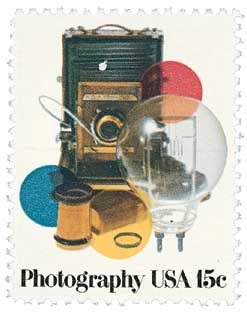Â
U.S. #1062
1954 3¢ George Eastman
Issue Date:Â July 12, 1954
City: Â Rochester, New York
Quantity:Â 128,002,000
Printed by: Bureau of Engraving and Printing
Printing Method: Â Rotary Press
Perforations:  10 ½ x 11
Color:... more
Â
U.S. #1062
1954 3¢ George Eastman
Issue Date:Â July 12, 1954
City: Â Rochester, New York
Quantity:Â 128,002,000
Printed by: Bureau of Engraving and Printing
Printing Method: Â Rotary Press
Perforations:  10 ½ x 11
Color: Â Violet brown
Â
Birth Of George Eastman

Entrepreneur George Eastman was born on July 12, 1854, in Waterville, New York.
Eastman’s family ran a farm in Waterville until 1860 when they moved to Rochester, where his father had started a business school. Eastman began attending a private school when he was eight. After his father died, his mother took in boarders to pay for him to continue his education.

However, by the time he was 15, Eastman dropped out of school to help provide for his family. He promised that he would repay his mother for all of the hardships she faced while raising him.Â
Eastman enjoyed photography but was bothered by the difficult development process. After three years of testing, he invented a dry photographic plate. In 1880, he began a photographic business. He invented the first successful film roll in 1884. Four years later, he revolutionized photography with the Kodak. This lightweight, box-shaped camera contained film wound on rollers, which eliminated the need for plates. It was the first camera made for roll film. Eastman advertised the camera with the slogan, “You press the button, we do the rest.â€Â The low-cost and easy-to-use camera made photography available to amateurs.Â
Eastman began offering film stock in 1889, and within seven years, was the largest seller of film stock in the world. He incorporated his company as Eastman Kodak in 1892. Eastman Kodak Company became one of the biggest photographic film and camera manufacturers in the world. Years later, Eastman’s invention of flexible film would be a major factor in the development of the motion picture.Â

Eastman sought to keep his workers happy and developed benefit programs for them, including a profit-sharing program. He also promoted a woman to the head of his personnel department, making her one of the first women in the US to hold an executive position in a major company.Â
Thanks to the success of his business, Eastman was one of the leading philanthropists of the day. Eastman’s giving was largely focused on education and health care. He donated more than $100 million to different projects in Rochester and Cambridge, Massachusetts, as well as a number of schools. These included the Rochester and Massachusetts Institutes of Technology and Tuskegee and Hampton Universities. He established the Eastman School of Music and the schools of dentistry and medicine at the University of Rochester. He also developed dental hospitals in London and Stockholm.Â

Eastman suffered from intense pain in his spine in his final two years that left him barely able to walk. Having watched his mother suffer from significant pain before her death, he took his own life on March 14, 1932.Â

Eastman is honored on many of the college campuses that he donated to. His Rochester home was made into a museum and was designated a National Historic Landmark. He’s also the only person with two stars on the Hollywood Walk of Fame, both for his role in inventing roll film. The Kodak company is still in operation today, though it has evolved over the years to survive in the increasingly digital market.
Click here for more from the Eastman Museum website.
Â
Less 













